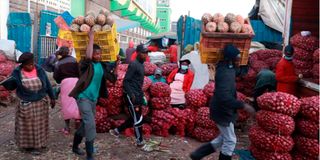Integrate smallholders into global value chains

Traders selling their produce at Marikiti Market. Reliable access to offtake markets for farmers remains a huge opportunity to increase incomes, boost productivity and strengthen food security.
Reliable access to offtake markets for farmers remains a huge opportunity to increase incomes, boost productivity and strengthen food security.
Market access can only reduce poverty and hunger for farming families if appropriate measures are taken to minimise market risks, like reducing the unequal market power that intermediaries wield. That said, many smallholders still face difficulties accessing markets to sell their produce at a fair price.
The constraints range from their remote locations, high transportation costs and limited knowledge of market trends. They also need bargaining power to interact on equal terms with market intermediaries. Integrating farmers into more inclusive, profitable market systems can increase incomes, link smallholders to value chains and secure markets at stable prices.
Economic resilience
Over the past two decades, Kenya has made significant progress towards increasing agricultural production, improving nutrition and reducing poverty, driven mainly by subsistence farming programmes. Our next farming phase requires us to embrace a market-oriented food system. The government has made clear its commitment to shift farmers from subsistence to commercial farming; market access is the intersection point in the link between food security and economic resilience.
Integrating smallholders into global value chains for high-value products will play a big part as we pivot towards a market-driven commercial agricultural system.
That said, farming for the market can still be risky. Produce markets are variable and unpredictable, and farming goods are perishable. Therefore, farmers will need access to ready markets that also pay well.
Already, select agricultural organisations provide market access solutions for high-value crops like Hass avocado and macadamia. Similarly, several counties have begun incorporating market access initiatives into their County Integrated Development Plans (CIDPs), representing a long-term collaboration area between the government and other sector players.
Experience shows that farmers are often willing to invest in diversified income streams if markets are guaranteed. We can create even better value for farmers if we enhance collaboration between the government and the private sector to a point where private organisations can, for instance, provide inputs to farmers on credit and develop buyback programmes.
Additionally, training and access to high-value crops as alternatives to staples like maize and beans can also incentivize crop diversification. This is necessary as staple crops are now riskier to farm due to climate change.
Furthermore, by diversifying, farming households can spread production and economic risk over a broader range of crops. Besides, harvesting at different times of the year cushions farmers from price-related income shocks due to dependence on similar cropping cycles.
By addressing the constraints that the private sector faces, such as high business costs and market regulation, the government can help accelerate scaling and adoption. If we can further smooth out collaboration between these entities, we can create a truly market-driven agricultural system.
Mr McCourt is the government relations lead at Tupande, by One Acre Fund. [email protected].





